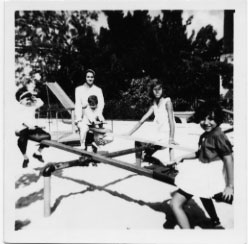Havana Homecoming
Travel Stories: Her family left Cuba when she was 3. Decades later, Leslie Berestein visits her old neighborhood, knocking on doors, searching for her Cuban self.
05.02.01 | 1:11 AM ET
 Photo courtesy Leslie Berestein
Photo courtesy Leslie BeresteinI had been in Havana less than three days and already I was arousing suspicion. The taxi driver kept glancing over his shoulder at me as we rumbled along a crowded downtown street, wondering how such an obvious foreigner could sound so Cuban.
“Where did you learn your Spanish?” he asked.
He had reason to wonder. My clothing was cleaner and newer, my skin smoother and paler, than those of any of the people my age milling about on the sidewalk.
“I was born here,” I explained. “This is my first time back since I was three years old.”
The driver pondered this a moment. “You left when you were only three? Ah,” he mused, “then you’re hardly Cuban at all any more.”
It was nearly dusk, and clouds of dust and diesel smoke tinted the air brown, making the crowds and the crumbling neoclassical buildings we passed look fuzzy and surreal. Through the dirty window I could see the faces of people who might have been my classmates, neighbors, friends, lovers. They hurried down the street, women sweating in cheap polyester dresses, sooty men on bicycles pedaling behind exhaust-belching buses. I tried to picture myself among them as if I had never left, hustling home exhausted by the sheer difficulty of life with a few plantains and bit of black market pork stashed in my shopping bag, provided I had the means.
“I’ve always liked to think I’m Cuban,” I told him. “But I don’t know.”
I’ve never known. Children of immigrants are really two people, the one who is and the one who would have been. That other me ceased to exist when my family left Cuba ten years after the revolution, my parents complaining of long lines and little opportunity. Like most immigrant parents, they wanted to give me a comfortable life. So they came to the United States, and I became a different person in the process.
Growing up in Los Angeles, Cuba was little more to me than a myth, a shadowy world of black and white that existed only in old photographs. There were photos of our house in Havana, of me playing with my first friend next door, of my grandmother—a stranger who wrote saying she loved me—cradling a gray baby against mildewed foreign walls. I remember feeling guilty for not being able to feel sadness when she died. In my young mind, she was a black-and-white photograph, a handful of letters on thin paper, a crackling, disembodied voice calling from a remote place that I was repeatedly told had once been my home. None of it seemed real, not my grandmother, not even the child in the photos everyone said was me.
I returned last year as a tourist, eagerly bracing myself for the emotional impact that I knew would inevitably come when I arrived. I would see the same weathered buildings I had seen in the photos, the same flat rooftops, the same narrow streets, and finally feel a connection. I would cry with relief, home at last. The morning after I landed, I excitedly flung open my hotel window and gazed out past the weathered rooftops at the Caribbean, repeating, “I’m here, I’m here,” like an incantation. Nothing happened. Faded laundry fluttered in the moist breeze, horns honked below, the clouds shifted overhead. I could have been anywhere.